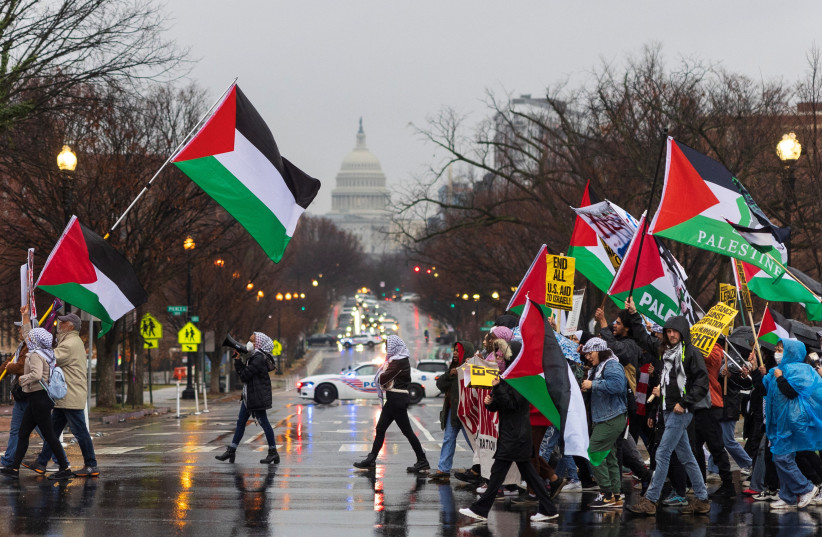Since 2006, a succession of US special envoys to monitor and combat antisemitism (SEAS) have made great strides in the global fight against Jew-hatred, and under President Joe Biden we have seen unprecedented efforts to apply these principles on the home front.
This has never been more important or urgent, and the next stage demands a new framework to match the president’s ambitious goals. If Americans are serious about tackling antisemitism in our country, then we need a full-time coordinator within the federal government whose primary job is not international diplomacy.
Last May, following a series of consultations and submissions, the White House issued its landmark National Strategy to Counter Antisemitism, a “whole of society” approach involving data collection, tracking, hate crimes enhancements, equal opportunity enforcement, training, education, the US Holocaust Memorial Museum, and security (FBI, Homeland Security, Treasury and Justice Departments, online platforms, state and local authorities), as well as a full range of community-based institutions.
These are admirable goals, and certainly, the Biden administration has confronted the upsurge of antisemitism in word and deed.
But institutionally, the bulk of federal actions are not coordinated in any centralized or consistent manner. That would require a central command post and clearinghouse and a generation-long commitment to realize fully, and the next steps are critical.

The 2004 Global Anti-Semitism Review Act (GARA), was initiated by Congress to ensure the US Government helps all nations to dress their own legacies of hate and discrimination, and to work together for global standards and cooperation. Establishing the SEAS envoy was integral to fulfilling this mission.
Though each SEAS appointee has made their own mark, none has been as distinguished or consequential as our current antisemitism envoy, Ambassador Deborah Lipstadt.
Prof. Lipstadt is an articulate and renowned voice on all forms of antisemitism and a champion against Holocaust denial and other forms of Jew-hatred from American academia to Europe and Israel. Given her breadth of expertise and the fact that she holds the only federal antisemitism-specific portfolio, it’s been natural to avail her professional talents in crafting and implementing our domestic policies against antisemitism; more so since October 7 and the spillover from anti-Israel protests.
Criticism of Donald Trump
As Donald Trump was preparing to leave the White House in December 2020, I criticized his administration and his antisemitism envoy for playing domestic politics and for recklessly using the “antisemitism” label to stigmatize critics of Israel. Trump’s own rhetoric and his alliances with open antisemites and white supremacists at home and abroad further compounded the harm.
As I pointed out at the time, the GARA mandate expressly limits the envoy’s scope to “monitoring and combating acts of antisemitism and antisemitic incitement that occur in foreign countries.” Roughly the same goes for every office within the State Department: Their roles are outward-facing and restricted from addressing issues and managing programs within the United States.
Certainly, it’s critical for the envoy and her staff to engage Americans about the work they are doing overseas and within the Department of State, and to facilitate the sharing of best practices between American experts and their foreign counterparts. But the premise and the mechanisms, even the terminologies, are different.
The budget for such a global mandate was already tight enough, without also becoming the one-stop shop for all antisemitism within the United States. And the burden of fighting Jew-hatred, while also navigating concerns about jurisdictions and free speech, is too great not to have a designated coordinator within our domestic-facing bureaucracy.
Institutionally, the Executive Branch just doesn’t like adding portfolios or being micromanaged by Congress. When we were lobbying for the passage of GARA, 20 years ago, some of the strongest resistance came from the White House and Department of State. And even after the bill was enacted, it took months for the Bush administration to appoint an envoy – as has been the case with most subsequent envoys. Elevating the position to the rank of ambassador also required Congressional impetus.
Most likely, the new position would be housed within the Department of Homeland Security, our newest and most versatile cabinet-level department. This allows the harnessing of all players nationally and regionally within law enforcement as well as education, civil rights, and public and community outreach. It is a mammoth task, but not as daunting as trying to do it with one foot overseas.
A State Department office with no domestic jurisdiction can never manage the myriad bureaucratic, societal, and constitutional complexities across 50 states and dozens of federal agencies. We must ensure that the fight against one form of hate doesn’t feed the fires for other forms of discrimination and demonization. And we must always strive to balance freedom from persecution with freedom of speech.
These and other home-front challenges can’t adequately be met or resolved by repurposing resources that were custom-designed for diplomacy.
Whether these steps are taken by Congressional initiative or by Executive Order, it’s well past time to get started. We need full-time US leadership against antisemitism on the world stage, and Americans deserve our own coordinator to ensure we live up to the very standards Ambassador Lipstadt rightly demands internationally.
The writer, a former executive with the World Jewish Congress, is a lobbyist and consultant.
